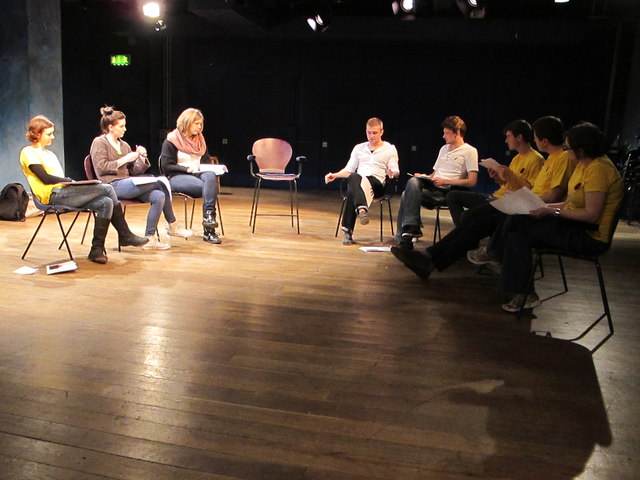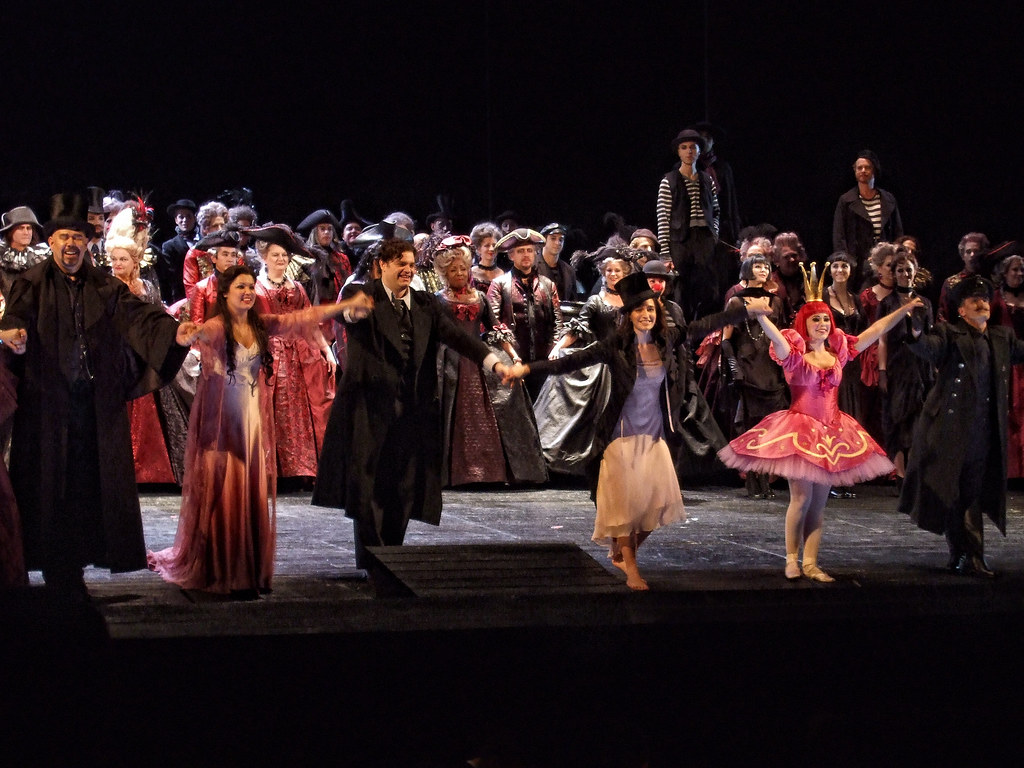 Here we go again with another little thought-experiment style game, this time marrying some popular card & board game mechanics with a free-form narrative framework. You'll need to do a little bit of preparation to make some components for the game and then a little bit more each time you sit down to play it: it might go heavy on the index cards or post-it notes, so make sure you have plenty of those to spare.
Here we go again with another little thought-experiment style game, this time marrying some popular card & board game mechanics with a free-form narrative framework. You'll need to do a little bit of preparation to make some components for the game and then a little bit more each time you sit down to play it: it might go heavy on the index cards or post-it notes, so make sure you have plenty of those to spare.The Theatre
This game is a tribute to the theatre and all the players take on roles both behind-the-scenes and on-stage over the course of play, but the precise roles change from round to round of the game. Your advance preparation consists of making a set of behind-the-scenes role cards as outlined here:
- The Producer: When selecting behind-the-scenes roles for a new act, you choose first; if you have this role in the last act, swap it for any unused behind-the-scenes role of your choice.
- The Playwright: You choose the setting & theme for this act from those agreed by all the players at the start of the game; give it a title as well.
- The Director: You choose a mood for this act, an emotional response that it must elicit from the audience, e.g. tears, laughter, excitement, etc.
- The Scene Shifter: You choose a specific location for this act, working within the setting & theme selected by the Playwright.
- The Costumer: You choose the on-stage roles for this act from those agreed by all the players at the start of the game; choose one per player, not forgetting to include yourself.
- The Lead: You choose first when selecting on-stage roles for this act; you may even choose a role the Costumer has not selected.
- The Casting Director: You hand out the on-stage roles selected by the Costumer to the other players for this act, except the Lead who always gets to choose their own role first.
- The Stage Hand: Once per act, you may dictate one special effect that occurs on stage, ranging from changing an aspect of the scenery to any special lighting or sound effects.
- The Prompt: Once per act, you may dictate what line is spoken by an actor on stage or correct something they have just said and give them a new line to speak.
The Season
One session of The Fourth Wall encompasses an entire season of one-act plays, so before you can begin playing, you first need to agree on what plays you are going to put on this season. Everyone takes three index cards and writes down a setting on one, a theme on the other and either a setting or a theme on the third. Settings are the broad geographic & historic locations of the plays, while themes are the types of stories being told.
Example Settings: Medieval Europe, Victorian England, Pre-Colombian America, Futuristic Moon Colony, Ancient China, Modern Japan, etc.
Example Themes: Crime & Punishment, Romance, Melodrama, Murder Mystery, Feelgood Musical, Pantomime, Slapstick Comedy, Experimental Prose, etc.
 Keep the settings and themes in their own stacks: each act is composed of one setting and one theme, as chosen by the Playwright or selected at random if there is no Playwright taking part in this act.
Keep the settings and themes in their own stacks: each act is composed of one setting and one theme, as chosen by the Playwright or selected at random if there is no Playwright taking part in this act.
Next up, the whole company needs to agree some on-stage roles: these are the archetypal parts that will feature across the season of performances, but their exact portrayal will depend on the setting & theme of that play and the actor who is playing them. You need to have at least 50% more on-stage roles than there are players in the game, e.g. if you have 5 players, then you need at least 8 on-stage roles. An on-stage role is just a capsule description, enough to loosely determine how they should be portrayed and to suggest what they might be doing in that play. Discuss ideas, throw them out there, but don't be afraid to veto anything that really turns you off and that would spoil the game for you if you were made to play it. Keep these on-stage role descriptions short and to the point, refining them down to two words if you are able, but certainly no more than five words at the upper limit.
Example On-Stage Roles: Honourable Leader, Troubled Heir, Courageous Youth, Scheming Business Owner, Confused Servant, Cheerful but Nosy Neighbour, etc.
Put the on-stage roles in their own pile: the Costumer will need to select one card per player from this pile for each act, or simply shuffle them and deal out as many as the number of players if there is no Costumer taking part in this act.
Finally, in the grand old-tradition, have a little ice-breaker activity where each player introduces their character for the game: keep this very simple and archetypal, something with a very clear, strong quirk that will be easily recognisable no matter what on-stage role you have. This is also a bit meta and can get very confusing, so the simplest solution might be to pick a well-known actor with their own particular quirks and do your best to portray them, e.g. pretty much everyone knows what to expect from Nicholas Cage, Dwayne Johnson, Whoopi Goldberg or Maggie Smith.
Super-Meta Sub-Game: If you like, you can actually play a theatre game as a warm-up/ice-breaker, if you know any; if you want to go beyond the Event Horizon of meta, then instead of actually playing that game, you could each simply narrate what happens, in a short montage that illustrates your own particular quirk alongside everyone else's. This is a deep rabbit-hole of meta that you may never emerge from though, so proceed with caution.
The Play
For the first round of play, just shuffle all the behind-the-scenes roles together and deal one at random to each player; in subsequent rounds however, the Producer chooses a role currently held by another player and takes it for the new act. The player they chose from then chooses from someone else and so on until there is only one player left to make their choice; they can choose any remaining role, including those not currently in play. After everyone has a behind-the-scenes role for this act, the unused cards are put to one side.
- If the Producer is ever not in play when choosing new behind-the-scenes roles, then everyone gets a random role as at the beginning of play, but if you get dealt a role you have already played, you may either ask to trade it with another player or trade it with one of the unused cards.
- If this is the last act of the game and you have the Producer role, immediately swap it with any unused behind-the-scenes role.

- If the Playwright and/or Costumer are not in play, then resolve their actions by shuffling and drawing cards at random until the requirements are met.
- If the Director and/or Scene Shifter are not in play, then resolve their actions by having each player make one suggestion for the mood and/or location, as appropriate. If the Producer is in play, then they don't make a suggestion but instead choose one from those presented by the other players; if the Producer is also not in play, then the Playwright does this instead; if not the Playwright, then the Lead does and if not them, then the Casting Director does.
- If the Casting Director is not in play, then the available roles are shuffled and dealt out at random until each player has one.
Performing
Once everyone has their on-stage role, the play can begin, but remember that it only consists of one act, so it is little more than a scene. As such, keep it pacey and punchy, hitting the tone set by the Director as early and as hard as possible: don't dawdle with backstory and laying foundations, just cut straight to the meat of the performance.
- One technique you can use to speed things up is best called 'Bad Exposition': just have your character walk on stage and announce their business to the audience as if revealing their inner thoughts to their diary. If you can insert some good exposition, that's even better, but don't feel pressured to do so: you're playing the game to have a good time, not to try to become the next Pinter.
During the performance, the on-stage roles push and pull against each other, using their dialogue and actions to portray this dynamic, but when you act, you have the option to exit the stage, turning your on-stage role face down when you do so. When you exit, your role's part in the play is over, so use this to wrap up their story in some significant way, e.g. they leave with their bags packed, they are arrested, murdered, their proposal is accepted, they break down weeping after their confession, etc.Whatever your exit action is, it can't be undone by anyone still on stage, e.g. if you are arrested, then no-one else gets to free you from custody; if you're killed, then no-one gets to resurrect you and so on. Your exit action only dictates what happens to your role however, not anyone else's: if they are still on stage, then they can still act, so even if you use your exit to dictate that they also get arrested alongside you, they are still free to argue for their own release from custody or just escape the police and go on the run, etc.
Everyone who exits becomes part of the Audience; once at least half the roles have exited the stage, the play is nearly over. It ends either when the next role exits the stage or when the whole Audience applauds simultaneously; as an Audience member, you can applaud at any time and try to encourage others in the Audience to applaud with you, but the play isn't over unless everyone in the Audience applauds at the same time.
When an act ends, whether with applause from the Audience or because more than half the roles have exited the stage, set-up the next act as described above. When you complete the last act of the season, the game is over and you can all give your reviews of the plays and/or the actors who appeared in them, or any other roles which you thought were especially noteworthy.


No comments:
Post a Comment